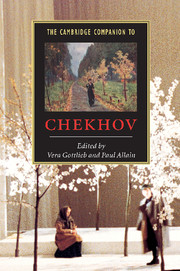Book contents
- Frontmatter
- Part 1 Chekhov in context
- Part 2 Chekhov in production
- 4 From Platonov to Piano
- 5 Chekhov's one-act plays and the full-length plays
- 6 Ivanov: the invention of a negative dramaturgy
- 7 The Seagull: an adaptation
- 8 Notes from a director: Uncle Vanya
- 9 Notes from a director: Three Sisters
- 10 The Cherry Orchard
- 11 Acting Chekhov: 'a friend to the actor'
- 12 The scenography of Chekhov
- 13 Chekhov on screen
- 14 Chekhov on the Russian stage
- 15 Directors' Chekhov
- Part 3 Chekhov the writer
- Appendix 1 Chekhov's works: primary sources from the Russian - Variations of English titles from the Russian
- Appendix 2 Selected stage productions
- Appendix 3 Selected screen versions
- Appendix 4 Illustrations
- Selected bibliography
- Index of Works by Checkov
- General Index
6 - Ivanov: the invention of a negative dramaturgy
from Part 2 - Chekhov in production
Published online by Cambridge University Press: 28 May 2006
- Frontmatter
- Part 1 Chekhov in context
- Part 2 Chekhov in production
- 4 From Platonov to Piano
- 5 Chekhov's one-act plays and the full-length plays
- 6 Ivanov: the invention of a negative dramaturgy
- 7 The Seagull: an adaptation
- 8 Notes from a director: Uncle Vanya
- 9 Notes from a director: Three Sisters
- 10 The Cherry Orchard
- 11 Acting Chekhov: 'a friend to the actor'
- 12 The scenography of Chekhov
- 13 Chekhov on screen
- 14 Chekhov on the Russian stage
- 15 Directors' Chekhov
- Part 3 Chekhov the writer
- Appendix 1 Chekhov's works: primary sources from the Russian - Variations of English titles from the Russian
- Appendix 2 Selected stage productions
- Appendix 3 Selected screen versions
- Appendix 4 Illustrations
- Selected bibliography
- Index of Works by Checkov
- General Index
Summary
Ivanov (1887) occupies an unusual place in Chekhov's theatre because it is rarely staged. The four main plays, which are generally more enjoyable, are frequently performed - as indeed is Platonov (1882), in spite of being an early work, but in which every flaw may be excused as a sign of chaotic but promising genius. If, in fact, Ivanov is read as a play either from Chekhov's successful maturity or his impetuous youth, one will inevitably be surprised and even disappointed: the play is rather heavy and complicated; the characters are verbose and excessive, and the main springs of the action are both evident and predictable. But if one considers the play as an open-cast quarry from which all his dramatic works will be extracted, or as a school for experimental dramaturgy, one is amazed by the richness of this discovery: all the ingredients are offered up with complete openness, as if the writing process - erasing and burying more than creating - had not yet taken place. Ivanov should not be underestimated. It would even be better to overinterpret it and imagine everything that has to be eliminated or covered up in order to find the tone, the concision and the economy of speech in the four major plays.
- Type
- Chapter
- Information
- The Cambridge Companion to Chekhov , pp. 70 - 79Publisher: Cambridge University PressPrint publication year: 2000
- 2
- Cited by



